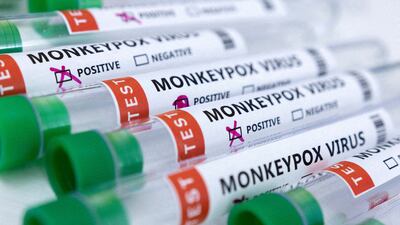Stigma and discrimination surrounding monkeypox “can only delay the response and deflect our attention from what needs to be done”, said Dr Ahmed Al Mandhari, the World Health Organisation’s regional director for the Eastern Mediterranean.
A total of 33 cases and no deaths from the disease have been reported in six countries in the Middle East and North Africa. They include 16 in the UAE, one in Morocco, six in Lebanon, six in Saudi Arabia, three in Qatar, and most recently one case in Iran.
“While it is predominantly affecting men who have sex with men, every one of us is at risk,” Dr Al Mandhari said at a press briefing in Cairo on Tuesday. “We have received reports of infection among children and women in our region and around the world.”
In the Middle East, an 8-year-old in Lebanon was among the reported cases. Iran’s first case was a 34-year-old woman.
Monkeypox is spread through close skin-to-skin contact with an infected person, or through touching infected objects.
It can cause a range of symptoms, including rash, fever, swollen lymph nodes, fatigue, headache and muscle aches.
Most people with monkeypox can recover safely at home with supportive treatment. However, in some cases the disease can cause severe illness with complications that could lead to death.
The WHO declared monkeypox a public health emergency of international concern last month, following an outbreak in non-endemic countries where the disease was not typically found.
The virus was first discovered in laboratory monkeys in 1958 and first identified in humans in 1970, in parts of Central and West Africa.
Since the start of this year, 96 countries have reported more than 40,000 laboratory-confirmed cases, including 12 deaths.
“Our collective focus must be on an effective public health response that will stop transmission and contain the outbreak,” Dr Al Mandhari said.
Vaccine supplies are currently limited and the WHO recommends targeted vaccination for people exposed to someone infected with monkeypox and those at high risk of exposure, such as health workers and laboratory workers.
Bahrain, which has not reported any monkeypox cases so far, opened registration for a limited stock of the vaccine earlier this month for priority groups.
Early case-finding and diagnosis, isolating cases, using contact tracing, and accelerating research into the effectiveness of vaccines and treatments, are all important tools to help contain the outbreak, Dr Al Mandhari said.
“New information is still unfolding about monkeypox, its mode of transmission and vaccine efficacy,” he said.
Since the earliest days of the current global monkeypox outbreak, scientists and public health authorities have been calling for the disease to be renamed, arguing that it has racist overtones and carries a stigma that will hinder efforts to stop its spread.
The WHO has said it would be working with partners to rename the virus, “to avoid causing offence to any cultural, social, national, regional, professional or ethnic groups, and minimise any negative impact on trade, travel, tourism or animal welfare”.
Covid-19 still a threat
As for the coronavirus, Dr Al Mandhari warned “this pandemic is not over and Covid-19 is not going away”.
Although the number of new weekly Covid cases decreased across the world this month, “people are still being infected and dying”, he said.
In the past week alone, more than 5.4 million new cases and 15,000 deaths were reported globally.
In the WHO’s Eastern Mediterranean region (Emro), which covers 22 countries and territories in an area stretching from Morocco to Pakistan, more than 80,000 people were infected and more than 600 died of Covid-19 over the same period.
Almost 46 per cent of people in the region are fully vaccinated with over 790 million doses administered, but momentum has waned.
“In 2022, the availability of the vaccine is no longer a bottleneck to vaccinate people,” said Dr Yvan Hutin, director of communicable diseases at WHO Emro.
“There are enough supplies,” Dr Hutin said, urging anyone eligible to get vaccinated and boosted.
Earlier this month, the WHO recommended France’s Valneva Covid-19 vaccine for those aged 18 to 50, including pregnant and breastfeeding women.


